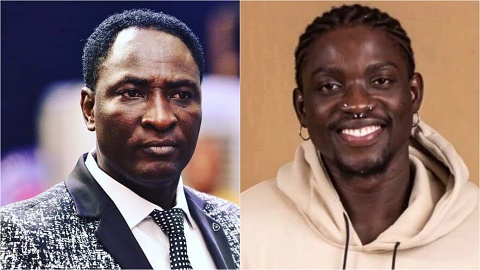A High Court in the Federal Capital Territory (FCT), Nyanya division, has issued a decisive ruling barring controversial social commentator and activist, Verydarkman (VDM), from making any further public statements about Prophet Jeremiah Omoto Fufeyin, founder of Christ Mercyland Deliverance Ministry. The ruling forms part of ongoing legal proceedings involving both parties, stemming from VDM’s repeated online claims deemed defamatory by the clergyman.
Presided over by Justice A.Y. Shafa, the court granted a full interlocutory injunction that restricts Verydarkman from speaking about Prophet Fufeyin until a final verdict is reached. The ruling follows months of back-and-forth between the two sides, centered on accusations made by the activist against the popular prophet, which the latter strongly refutes and regards as harmful to his reputation.
During Thursday’s court session, Justice Shafa dismissed all preliminary objections earlier filed by Verydarkman in an attempt to challenge the validity of the defamation suit. The court, instead, sided with the motion filed by Prophet Fufeyin’s legal team, led by counsel Ihensekhien Samuel, requesting a comprehensive order to maintain the status quo and protect the integrity of the ongoing legal process.
Legal sources confirmed that the court’s decision effectively silences Verydarkman from further discussing Prophet Fufeyin in any public or digital space, a move designed to prevent additional commentary that could influence the proceedings or exacerbate reputational harm.
Months prior to this ruling, during a court appearance in April, both legal teams presented arguments on all pending motions. At that time, Prophet Fufeyin’s lawyer revealed that the activist had verbally agreed not to make further public statements regarding the issue. However, that informal understanding has now been cemented into a binding judicial order, rendering any violation subject to potential contempt charges.
The ongoing feud between the activist and the church leader has been closely followed on social media, where VDM commands a sizable audience. His frequent and often provocative commentaries on religious leaders and public figures have drawn both support and backlash. Prophet Fufeyin, known for his large followership and philanthropic efforts, has insisted that VDM’s posts are part of a targeted smear campaign that must be addressed through legal means.
Speaking after the Thursday court session, Ihensekhien Samuel issued a press statement detailing the court’s pronouncements. According to him, “The FCT High Court today, in two rulings, dismissed all the preliminary objections filed by Verydarkman and instead granted a complete interlocutory order of status quo ante bellum until the final determination of the suit filed by Prophet Jeremiah Omoto Fufeyin.”
He further clarified that the decision followed a motion on notice filed by his legal team, seeking to halt any additional defamatory publications while the case remains active in court.
Justice Shafa’s ruling signifies a pivotal moment in the legal battle, placing the weight of judicial authority behind Prophet Fufeyin’s claims and effectively preventing any further escalation of hostilities through online discourse. The decision has been interpreted by legal observers as a clear message regarding the responsibility public commentators bear when making serious allegations, particularly against individuals whose reputations could suffer irreparable harm.
For now, the public will have to wait for the court’s final judgment on the substance of the case. No new date has been confirmed for that ruling, although it had initially been expected on July 2. With this new development, both parties are expected to maintain a legal and non-combative posture as the matter proceeds through the judicial system.
This case not only highlights the growing intersection of online activism and legal accountability but also raises broader questions about the limits of free speech in digital spaces, particularly when accusations verge into the realm of defamation.
As proceedings continue, the Nigerian public remains attentive to how the courts will ultimately weigh the evidence and determine where the line between opinion and defamation lies.













![Content Creator Angelica Kelechi Speaks Out on Alleged Sexual Assault at Khloe Abiri’s Spa [VIDEO]](https://blogger.googleusercontent.com/img/b/R29vZ2xl/AVvXsEgQStip4cn2DAOvQ2hNFU30OAFWoxfQIDOnStd0uVgwwxKrFAQYYvtFni6QV04OGP8dyKk5TCAhXM5es9linl1ClhjPzaazz2tTt0LmJ5lFVe5202o2McF9QROT1v2hEyNTdY-M1KRuLTY6OqqysKNfcsY5bCtwCIP8wEQ4AXcfQfTaXWWZiixqf82NDH5a/w72-h72-p-k-no-nu/abiri-khloe123.jpg)






0 Comments
Hey there! We love hearing from you. Feel free to share your thoughts, ask questions, or add to the conversation. Just keep it respectful, relevant, and free from spam. Let’s keep this space welcoming for everyone. Thanks for being part of the discussion! 😊